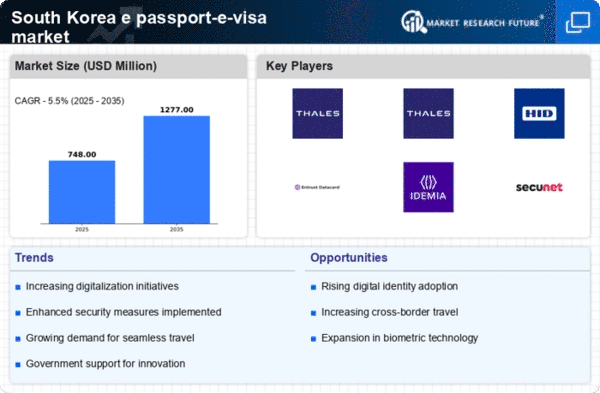Growing International Travel and Tourism
The e passport-e-visa market in South Korea is poised for growth due to the increasing volume of international travel and tourism. As South Korea continues to attract tourists from various regions, the demand for efficient travel documentation is on the rise. The tourism sector has shown a robust recovery, with a reported increase of 25% in international arrivals over the past year. This influx of travelers necessitates a streamlined approach to visa processing and passport management, thereby driving the e passport-e-visa market forward. The correlation between tourism growth and the demand for digital travel solutions suggests a promising outlook for the market.
Consumer Preference for Digital Solutions
Consumer preference for digital solutions is reshaping the e passport-e-visa market in South Korea. As technology becomes increasingly integrated into daily life, travelers are gravitating towards digital platforms for managing their travel documents. The convenience of applying for e visas and accessing e passports through mobile applications is appealing to a tech-savvy population. Recent surveys indicate that over 70% of South Korean travelers prefer digital solutions for their travel needs. This shift in consumer behavior is likely to propel the e passport-e-visa market, as service providers adapt to meet the growing demand for user-friendly digital interfaces.
Government Initiatives and Policy Support
Government initiatives play a crucial role in shaping the e passport-e-visa market in South Korea. The South Korean government has actively promoted the digitization of travel documents, aiming to streamline border control processes and enhance the overall travel experience. Recent policies have focused on integrating e visa systems with e passport technologies, facilitating smoother entry for international travelers. This strategic alignment is expected to boost the e passport-e-visa market, with projections indicating a potential growth rate of 20% over the next five years. Such government backing not only fosters innovation but also instills confidence among users regarding the reliability of digital travel solutions.
Rising Demand for Secure Travel Solutions
The e passport-e-visa market in South Korea is experiencing a notable surge in demand for secure travel solutions. As international travel continues to expand, travelers are increasingly concerned about the safety and security of their personal information. The South Korean government has recognized this trend, implementing advanced biometric technologies in e passports to enhance security features. This shift is reflected in the growing adoption of e passports, with a reported increase of 15% in issuance over the past year. The e passport-e-visa market is thus positioned to benefit from this heightened focus on security, as travelers seek reliable and efficient means to manage their travel documentation.
Technological Advancements in Biometric Systems
Technological advancements in biometric systems are significantly influencing the e passport-e-visa market in South Korea. The integration of cutting-edge biometric technologies, such as facial recognition and fingerprint scanning, enhances the security and efficiency of travel documentation. These innovations are not only improving the user experience but also expediting the processing times at border control. The e passport-e-visa market is likely to see increased adoption rates as travelers become more familiar with these technologies. Recent data suggests that biometric-enabled e passports have reduced processing times by up to 30%, making them an attractive option for both travelers and government agencies.
















